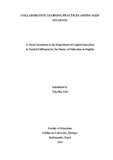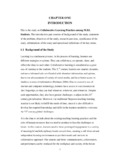Please use this identifier to cite or link to this item:
https://elibrary.tucl.edu.np/handle/123456789/1821| Title: | Collaborative Learning Practices Among M.Ed Students |
| Authors: | Giri, Teka Raj |
| Keywords: | Learning;Students;English Education |
| Issue Date: | 2019 |
| Publisher: | Central Department of Education English |
| Abstract: | The present study entitled Collaborative Learning Practices among M.Ed. Students was an attempt to find out the practice of collaborative learning among M.Ed. students and to explore the role of collaborative practices in their learning. The research was based on survey research design. All M.Ed. level students of Department of English Education were the population of the study. Among them forty-five students were selected as sample by using non-random purposive sampling procedures. The main tool for the data collection was questionnaire (open-ended and closed-ended). Both primary and secondary sources of data were used for this study. The findings of the studyshow that the students were involved in collaborative learningpractices through the process of group formation, task division, mutual understanding, team reflection, sharing to each other, managing the time and student-student interaction. The students viewed that the role of collaborative learning isfor getting detail understanding of the content, for preparation of class presentations, assignments and project works and to make them self-motivated. Themajority of the students (i.e. 97%) agreed that collaborative learning is useful for developing their critical thinking, team working skill, enhancing self-esteem, interpersonal skill,sharing culture,developing students’ social skills, increasing students’ retention, building positive relation among learners and building up confidence on learning and to become creative. The study has been organized into five chapters. The first chapter deals with background of the study, statement of the problem, objectives of the study, research questions, significance of the study, delimitations of the study and operational definitions of the key terms. The second chapter deals with the review of theoretical and empirical literature review, implication of the reviewed literature and conceptual framework of the study. Likewise, the third chapter deals with the methodology in which design, population, sample, and sampling strategy, research tools, sources of data, data collection procedures and data analysis procedures are discussed. The fourth chapter deals with the analysis and interpretation of the collected data. Similarly, the fifth chapter deals with the findings based on the analysis and interpretation of the data, conclusions derived from the findings and recommendations. This is followed by references and appendices. |
| URI: | http://elibrary.tucl.edu.np/handle/123456789/1821 |
| Appears in Collections: | English Language Education |
Files in This Item:
| File | Description | Size | Format | |
|---|---|---|---|---|
| Cover Page(1).pdf | 46.77 kB | Adobe PDF |  View/Open | |
| Chapter Page(1).pdf | 212.13 kB | Adobe PDF |  View/Open |
Items in DSpace are protected by copyright, with all rights reserved, unless otherwise indicated.
